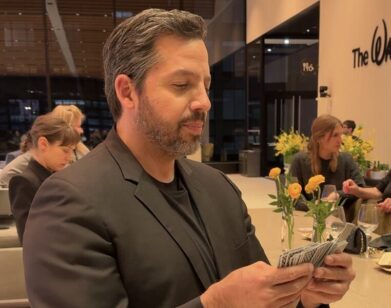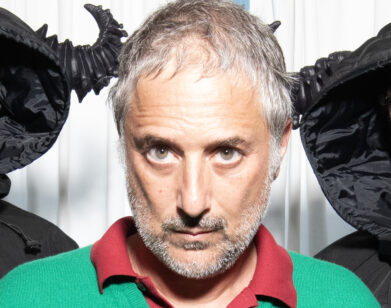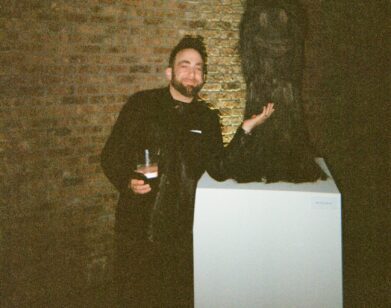Marc Smerling, Zac Stuart-Pontier, and the Expanding Web of Crimetown
MARC SMERLING AND ZAC STUART-PONTIER IN BROOKLYN, NEW YORK, MARCH 2017. PHOTOS: TESS MAYER. GROOMING: PATRYCJA CICHON.
“I think every city has its unique culture of crime,” explains Marc Smerling at the Gimlet offices in Gowanus, Brooklyn. “Cities, by their nature, are Petri dishes for crime because there’s a lot of people jammed into a very small space,” he continues. “City government is probably the most vulnerable to corruption … it’s very easy to fall into the patriarchy.”
Crimetown, the nonfiction podcast created and presented by Smerling and Zac Stuart-Pontier, is an ambitious, anthropological epic. Set in Providence, Rhode Island, during the 1970s, ’80s, and ’90s, the series traces the expansive web of organized crime in the U.S.’s smallest state. Characters weave in and out of the narrative; in certain episodes they are the protagonists, in others they are referenced only fleetingly by reputation. There are plenty of familiar figures who appear, including Buddy Cianci, the infamous former Mayor of Providence, and Raymond Patriarca Sr., the Italian-American mob boss who was allegedly one of the inspirations for The Godfather. Then there are a few surprises: a recent episode, for example, focused on the death of Patriarca Sr. through the lens of his doctor, the first female cardiologist in Rhode Island, who, in her youth, was a vocal women’s rights and anti-war activist.
“We’ve probably done 100 interviews. There are a couple of duds, but most of these people have incredible stories,” Smerling tells us. “You’re weaving a serial, and the serial is defined by these intersecting relationships, so you can’t have everybody.”
Though Crimetown is Smerling and Stuart-Pontier’s first podcast, they have previously worked together on several film and television projects. The duo initially met while editing Henry Joost and Ariel Schulman’s Sundance film Catfish [2010], and wrote, produced, and edited the Emmy-winning HBO series The Jinx: The Life and Deaths of Robert Durst [2015]. Independently, their credits include Martha Marcy May Marlene [2011], Simon Killer [2012], and Bleed For This [2016], all of which Stuart-Pontier edited, and Capturing the Friedmans [2003] and All Good Things [2010], which Smerling wrote and produced, respectively.
At least seven episodes remain in this first season of Crimetown. For the second season, Smerling and Stuart-Pontier hope to move onto another city. “We’ve been talking about Detroit,” remarks Smerling. “Kwame Kilpatric was the youngest mayor after Buddy [Cianci] and that whole story is fascinating.”
EMMA BROWN: Why Providence?
MARC SMERLING: I have history there. I married a woman from Providence; she was Italian and from the hill next to Federal Hill, Smith Hill. I had gone there a lot in college—we met in college—and I noticed a strange culture that was also extremely interesting, this bisected city. You had College Hill and the beautiful campus of RISD and Brown, and then you had Federal Hill, where you’d get a bit of pasta and pizza, but also the craziness was still going on there. It was the early ’80s. Then my father-in-law introduced me to Buddy Cianci at the Biltmore Hotel at the end of the bar. I was probably 19 and he struck me as this larger-than-life character. He had this way of casting his spell on you; he could seduce people and I was seduced. Not long after that, I remember reading about how he’d beaten a guy with a fireplace log. I got sucked into Providence. I love it; I love the city.
BROWN: Why did you wait? Why didn’t you make a film about it—
SMERLING: Years ago? The project that I always thought would be interesting is what we are doing, and it has such girth and complexity that I didn’t think it would be easy to do in film. I think it would be a great scripted project—this intersecting of relationships and tapestry of humanity that’s unique to Providence, because everyone’s related as Rhode Islanders even if they’re not related by blood. It would have been difficult; it’s totally possible to do it, but we were doing much more linear stuff with Capturing the Friedmans and then Catfish with Henry [Joost] and Rel [Schulman] and then The Jinx. Those were projects that appeared; this was something I’ve wanted to do and was thinking about and the opportunity to do it never really came about.
BROWN: When you started Crimetown, did you think Buddy Cianci would be the protagonist? Did you have a main character in mind?
ZAC STUART-PONTIER: No. We were just talking about making a crime podcast at first and trying to figure out what that would look like. Marc had obviously known about Providence and reached out to some of his law enforcement contacts, and we found Charles “The Ghost” Kennedy. He was the first interview we did. I don’t think we knew how wide the scope would be; it was more that he led to another interview and then another interview. Then we sort of stepped back and said, “Oh we’ve got to tell the story of this whole city.” Marc probably knew before me. I was worried about scope creep—we could tell every story that took place in this city ever.
SMERLING: I think Buddy was always going to be a part of it; we were after him pretty early on. I was talking to Buddy; my father-in-law once again came to the rescue and got me his cell phone number. It was going pretty well. He’s a very guarded guy and he’d sold his life rights to this person and then they’d sold it to that person, and he didn’t want to make them angry, so I had to talk to them and it just went on and on. There was obviously a lot of feeling me out. One day he calls and I’m in the middle of lunch with someone, but it’s Buddy, so I get up. He’s talking and talking and talking, and he goes, “Oh, by the way, you’re having lunch with somebody tomorrow.” [Zac had] set a lunch with a potential editor who’s actually from Rhode Island, and somehow Buddy had Rhode Island-ed it.
STUART-PONTIER: Or the guy who wanted the job had Rhode Island-ed it and called in a favor from Buddy, and Buddy was calling to help get this kid the job.
SMERLING: It was a guy who knew a guy.
BROWN: Did you hire him?
STUART-PONTIER: We did! Of course.
SMERLING: I told Buddy the fact that Zac had put a lunch on the schedule meant he was probably pretty much hired as it was. Then [Buddy] said, “I want to do it. Next time you come up here let’s sit down and start talking.” Two days later he dropped dead. We were in a panic a little bit, because we’d already formed in our mind this idea of the two hills, and we had one hill pretty good, but the other hill just lost its protagonist.
STUART-PONTIER: We were so nervous about the criminals at first. We were like, “No criminal would ever want to talk to us after The Jinx. Nobody’s going to talk to us.” In the end, all the criminals wanted to talk, and it was the politicians that were really the cagey ones.
BROWN: Did people know about The Jinx? Did that help you or hurt you?
SMERLING: It helped. Even with Buddy, he watched it and he was like, “Wow, you guys are good at this.”
STUART-PONTIER: There’s a great voicemail that he left for Marc: “I saw you on TV, that crazy guy, that Durst thing. Yeah, you were good.” [laughs]
SMERLING: We were kind of moping around at Zac’s looking at tapes of Buddy. We’d already sold the show.
STUART-PONTIER: We were like, “Is it even going to work without Buddy?” We were pulling all the archival tapes. We knew about this autobiography he’d written, and on his book tour, Buddy mentioned offhandedly, “Me and my co-author, we just taped everything. He taped 30 hours of me telling my life story at dinners and then he went off and wrote the book.” The light bulb went off—we’ve got to get these tapes.
SMERLING: It took a little while. [laughs]
STUART-PONTIER: Marc began the long journey of trying to get permission to use the tapes.
SMERLING: I found the author fairly quickly. [He said,] “I’ve got these tapes somewhere. I don’t need any money, but you’ve got to get permission from the family.” We got permission from the one guy then that guy suddenly wasn’t the guy anymore and eventually the dentist comes into the picture—a nephew. He signed the release and we got the tapes.
BROWN: Buddy’s children are no longer alive?
SMERLING: He’s got grandchildren. His daughter died.
STUART-PONTIER: Sort of tragically.
SMERLING: Of an overdose.
STUART-PONTIER: Right after he got out of jail. Spoiler alert: he was in jail. [laughs]
BROWN: In one episode, Charles Kennedy talks about his wolves. I think I laughed out loud when he said when he revealed that one of them was named Tatiana.
STUART-PONTIER: Charles has a gift for naming things. They have this thing called “The Invisible Staff Car,” and that’s how they moved around the drugs. He calls Marc’s car “The Toaster.” “Where’s the Toaster?”
SMERLING: It’s a mafia thing; they all love this. “Baby Shacks,” “Joe Onions”—they called him Joe Onions, because he was so good looking he made the girls cry.
BROWN: Was your father-in-law happy that you were telling this story about Providence?
SMERLING: I don’t think he had an opinion either way. That generation, they don’t talk about things like we do. We’re very open. The Italians from Federal Hill, they have this incredible family life, but there’s just a lot of weight on their shoulders. He didn’t really speak to me about his feelings, but I know he loves the show.
STUART-PONTIER: There was pushback, though, from the Providence of it all.
SMERLING: [But] not from my family.
BROWN: You mention in the podcast that you talked to Buddy’s ex-wife, but she didn’t want to be taped. Were there a lot of people like that? How does it work? Can you use anything they say?
SMERLING: No, but they’re good for reference. Sheila, who was Buddy’s wife, and I have become close. She’s got her reasons, which I understand, but I wouldn’t have met Barbara Roberts without her. You keep moving through the material—it’s swimming in that pool and trying to find these pieces and put the story together. For example, we needed a way to end Patriarca’s life and his rule, but we didn’t want to make [an episode] about the mob boss dying. We wanted to find an interesting perspective on that, and Barbara Roberts gave us a great insight. [Her story] has all the irony about Providence; Mike Stanton [from the Providence Journal] says it, but Providence really is a journalist’s theme park because there is so much irony. These people love the mob boss; even though he’s probably ordered the murders of 30 people, they bask in his glory. They love their mayor even though he’s kind of crooked. There’s an irony to everything and they don’t seem to see the irony. I think Barbara does to some extent. She really wanted to tell her story and get it out there. I don’t think she’s trying to rationalize it, she just wants to say, “This is what I did.” I think she’s sort of stunned by it at this stage in her life, but she did it, and that’s very Providence. It’s not an accident that Barbara Roberts, who was a huge feminist and huge anti-war activist, ended up in Providence, Rhode Island. It’s the state of rebels.
BROWN: Did you have a timeline in mind when you started working on the show?
STUART-PONTIER: Yeah. It’s the moment that they intersect, Buddy and Patriarca, through Buddy’s downfall basically. Buddy’s sort of the skeleton that the whole show is hung on.
SMERLING: It’s the Shakespearean tale of the young man with great vision who becomes everything he abhors.
STUART-PONTIER: The anti-corruption candidate goes to prison literally for corruption.
SMERLING: Ego is his Achilles heel. He falls into the world of, “I just need to get elected.” To get elected he starts making deals with wise guys, mostly through the unions.
BROWN: To put Patriarca in the larger context of the mob in the Northeast, Patriarca is Italian, and so he’s related to the New York Italian crime families and the Boston Italian crime organization that Whitey Bulger was fighting with. Is that correct?
SMERLING: Raymond Patriarca Sr. was made in New York. The big power back in the old days was in New York, the five families. Chicago and New York. Raymond went down to New York, but he was sent back up to New England when the old mob boss who was there for quite a while was going retire to Italy. Raymond took over and he was very good at what he did. He had connections. He used to go down on the train to New York City and meet with the Luccheses and the Genoveses, arbitrate disputes between the families. He was seen as a very powerful. Plus he had interests in all kinds of business, including Las Vegas casinos.
STUART-PONTIER: That’s the Frank Sinatra connection.
SMERLING: Frank Sinatra was on the board of one the racetracks he certainly owned through shadow companies, and they invested together in a Las Vegas casino.
STUART-PONTIER: Both [Patriarca] and Frank Sinatra were called in front of Congress to testify about this racetrack that they were making wealth off—illegal betting.
BROWN: You originally met through Catfish, right?
SMERLING: Yeah. I remember Catfish like this: I remember getting the disc of a rough cut, sent to me by Andrew [Jarecki]. I was out L.A., Andrew was in New York, and I watched it and I called Andrew up and said, “This is fascinating stuff.” Then I remember going to the office where they were making it, and there was this closet-sized room, and this little, pale young guy working the material. And that’s how I work, so I appreciated that. Then he and I were in that room—we just cleaned up the edit. But we spent a lot of time together.
BROWN: Zac, you worked on the movie Bleed for This. Was that related to Crimetown at all?
STUART-PONTIER: I did. A total Providence coincidence. This happens all the time in Providence. That is a totally separate connection. From my hometown, I know Ben Younger, who is a really talented writer-director. I just heard about a boxing movie. I didn’t even know it was set in Providence, and then the two things came together. That was helpful. We did interview Paz [Vinny Pazienza], who’s the subject of Bleed For This.
SMERLING: That’s a fascinating interview and we’re trying to find a place for it. He’s really fascinating. It’s amazing, the stories he tells.
STUART-PONTIER: Because he’s Italian, so his father was connected, so he has a really interesting perspective being this homegrown hero boxer, and there’s obviously a big crossover between the mob and boxing in general. Plus he had the family connection.
SMERLING: And a gambling problem.
BROWN: What made you decide to move from films to a podcast?
SMERLING: [With] The Jinx, we would go to this office where [we would sit next to each other in] a little closet-sized room. That was The Jinx for however many years a crazy amount of time we were sitting next to each other. We talked constantly, and we were talking about stories and series. The whole idea of making The Jinx not a movie, but a series, was just us sitting over lunch one day going, “Man, we could do a really good series with this. It would be better than House of Cards, Homeland. You know how they have these cold opens and hot ends, and weave it all together over time? It would be so much easier than trying to get this thing into this box.” We were working together in a very fluid way, and Zac brought up the podcast. I was severing my relationship with Andrew, and I didn’t know what I was going to do next. He was talking about what he was going to do next.
STUART-PONTIER: Funny connection. I know Alex [Blumberg, CEO and Co-founder of Gimlet Media] because I was on This American Life when I was a kid.
SMERLING: Not on. He was the star of a classic episode.
STUART-PONTIER: It’s a really fun episode about a con-artist in a small town, and I’m the kid who gets duped.
BROWN: Actually?
STUART-PONTIER: It was totally real. When I was 17, I met Alex in my mother’s newspaper office upstate. We just kept in touch over the years, and when we were talking about podcasts, we were originally talking about, could you do a podcast companion to The Jinx? We had all of this incredible audio that we weren’t using—phone calls, the trial in Galveston. Alex came by the offices and he watched the first episode and he loved it, and he liked the idea of doing something all three of us, but he didn’t want to do a “DVD extra” he said. “If you guys want to do something else, I’m down.” That was part of the conversation as Marc was thinking about what he was going to do.
SMERLING: Then we went to lunch one day and we started talking about it, and I thought of Providence. Also, we didn’t want to do another murder story.
STUART-PONTIER: That was a lot of it.
SMERLING: I was getting a lot of pressure to do another TV series. I was getting calls to showrun a TV series about murder stories. Everything is murder stories—JonBénet Ramsey, this and that. I didn’t want to be that guy. I wanted to broaden the crime landscape and do something a little more expansive.
STUART-PONTIER: We were talking about crime stories that wouldn’t necessarily be one crime or one person. How do you tell a crime story that can elevate the genre, that can do something more interesting than just one crime?
SMERLING: And pitch that as a TV show? You know what they’re going to say: “How about murder stories?” I just felt like we could do something different. And people are responding. Certainly Hollywood has responded. We’ve gotten calls from studios. But we had to tell that story. If you pitched it—”Well, it’s about Providence and the tapestry of crime and politics”—that’s really complicated.
BROWN: I love the Providence accent.
SMERLING: They have incredible accents, and they’re poets in their bound-up own way, because they can’t really say what they need to say—particularly Jerry Tillinghast.
STUART-PONTIER: Then it just became incredibly timely to be telling a story of corruption and tentacles and conflict of interest and a charismatic politician with questionable ethics.
BROWN: Were you surprised by how The Jinx unfolded?
STUART-PONTIER: I don’t know if we were surprised. [pauses] It was incredible to see the thing that we’d been making in the little room that Marc was talking about, to set it free and it makes this splash.
SMERLING: Yeah, but to say that we weren’t in contact with law enforcement before the HBO show aired, obviously we were. We had concerns, and moral and ethical concerns. Obviously we felt we had evidence that [Robert Durst] had committed murder, so we didn’t feel like it would be right for us to be like, “That doesn’t matter. It’s a TV show. It’ll be great.” There was definitely a feeling among us three—Andrew as well—that we had to do something, because we’d built these relationships with these people. I wrote the screenplay, so I was with [the father of Durst’s first wife Kathleen McCormack] Jim McCormack and his wife for six or eight years, and they deserved something as well, and so we were in contact with law enforcement. Was I surprised? I was not surprised. I knew that it was starting to gain some momentum with law enforcement.
STUART-PONTIER: But the timing was…
SMERLING: The timing was extraordinary, and we had no idea that was going to be happen.
BROWN: Is there anything you regret about The Jinx?
SMERLING: That’s a hard one. It wore on my relationship with my partner who I’d been with for a long time, so personally it was very hard, I think, on both of us. I think we came out of that diminished physically as well as emotionally. It was a lot of work, and it really was for a long time just Zac and I.
STUART-PONTIER: There’s that ellipses.
SMERLING: Oh yeah. There’s a couple of edits in it that we regret, probably, in retrospect, because we didn’t see how people would take them, even though we tested it and tried to be thorough. I don’t know if I regret it, but if I could change it, I would. Is that regret? [laughs]
BROWN: When you’re editing hours and hours of footage like that, does it affect you personally?
STUART-PONTIER: It’s a dark place to be. You’re numb to it. The crime scene stuff is tough. Definitely, it wears, and you have to look at it objectively. You have to go into a place where you’re sort of able to deal with that stuff, which is not necessarily the place you want to be. If you talk about relationships suffering, when you’re in a dark, dark place, you’re not necessarily great company for the people around you.
SMERLING: Yeah, it’s a relationship killer. You’re sitting there all the time, removing yourself. For me, dealing with Bob [Durst], was tough, because I never thought he was innocent of anything. I didn’t know anybody who had been so close to three people who had disappeared or were murdered. My assumption, in the beginning, was that he was guilty, but I had to put myself in a position where I had to assume he was innocent to do the work. You have to go under every rock and sniff out every lead and talk to everybody, so we were constantly talking ourselves into him being innocent. And then we would talk ourselves into him being guilty.
STUART-PONTIER: Trying to talk yourself into him being sympathetic, that was a big thing.
BROWN: When you’re focusing on one crime, or one person, like in The Jinx or something like Serial or The Staircase, is the ideal conclusion that the person confesses? Or that it doesn’t matter whether they did it or not.
SMERLING: For us, the ideal outcome is a level of honesty in the storytelling and depth that creates a new perspective on the actual events. Bob Durst’s story has been told a million times before we made The Jinx, and before I wrote All Good Things. When we first started talking it, people were like, “I’ve heard that story.” But to get below that, to get below where anyone had ever gone before and see these people for who they were, as close to what you could figure out who they were was, that’s ultimately the goal. That’s what we’re trying to do here. Inevitably you’re going to get people calling you up or writing you emails saying, “That was a terrible episode” or “What you guys are doing is making a muderer too sympathetic”—guys like Jerry Tillinghast or Raymond Patriarca or Bob Durst. But we’re not doing that. We’re just taking the veil off their entire lives, so that you get to see when they were kids and what formed them and why they’re that way. It makes people extremely uncomfortable to actually have to accept this person as a human being, rather than just a guy who kills people or the mob boss who ordered all of those hits.
BROWN: Do you think doing projects like these has made you more compassionate in your personal life?
SMERLING: Absolutely. Much more patient. There’s no instant gratification in life when you stretch it out in a series. Everything is grey. And that makes people crazy. That’s Capturing The Freidmans. It made people nuts that film. Either they hated it or they loved it, but nobody was in-between.
BROWN: Do you think there’s anything you can’t forgive?
SMERLING AND STUART-PONTIER: Oh, yeah.
SMERLING: I don’t think anybody can forgive Bob Durst. They shouldn’t forgive him. He killed his wife. She was a wonderful, beautiful person who was going to medical school and all she wanted to do was start a pediatric clinic. And he killed her. He’s an egomaniac and a narcissist, but that doesn’t make him inhuman.
NEW EPISODES OF CRIMETOWN COME OUT SUNDAYS VIA GIMLET. FOR MORE ON CRIMETOWN, VISIT THE SHOW’S WEBSITE.







